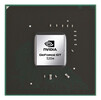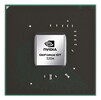NVIDIA GeForce GT 555M vs NVIDIA GeForce GT 520M vs NVIDIA GeForce GT 520MX
NVIDIA GeForce GT 555M
► remove from comparisonThe NVIDIA GeForce GT 555M is a fast middle class graphics card for laptops. Depending on the version, it is based on the GF108, GF116 or GF106 architecture with different shader counts, clock speeds and memory configurations. It stems from the Fermi generation and supports DirectX 11 and OpenGL 4.0.
Versions (From highest to lowest performance):
- 144 cores 709MHz (GF106), 128Bit GDDR5, e.g. MSI GX780
- 144 cores 590MHz (GF106), 192Bit DDR3, e.g. Dell XPS 17, Alienware M14x
- 144 cores 590MHz (GF106), 128Bit DDR3, e.g. Schenker XMG A501 / A701 (Clevo W150HRM / W170HN)
- 96 cores 753MHz (GF108), 128Bit GDDR5, e.g. Lenovo Y570p / Y560p
- 144 cores 525 MHz (GF116), 128 Bit DDR3, e.g. Medion Akoya P6812
GF106 architecture
The GF106 core of the GTX 555M is related to the GF100 core of the GeFore GTX 480M and offers 192 shaders and a 192 Bit memory bus for GDDR5. The GT 555M offers only 144 shaders and in some variants and a smaller memory bus with DDR3. Except for the memory controllers, the GF106 can basically be considered a halved GF104. Therefore, the architecture is not comparable to the old GT215 (e.g., GeForce GTS 350M) or GT216 (e.g., GeForce GT 330M) cores.
Unlike the GF100, the smaller GF104, GF106, and GF108 cores have been both shortened and considerably modified. In contrast to the GF100, which was designed for professional applications, these latter chips target the consumer market. They feature more shaders (3x16 instead of 2x16) and more texture units (8 instead of 4) and SFUs per streaming multi-processor (SM). Since there are still only 2 warp schedulers (versus 3 shader groups), Nvidia now uses superscalar execution to use the higher amount of shaders per SM more efficiently. In theory, the shaders can be utilized more efficiently and the performance per core can be improved.
However, it's worth noting that the performance of the GF106 can also be worse than the GF100 (and its predecessors) in worst case scenarios. The ECC memory protection, which is important for professional applications, was completely omitted and the FP64 hardware was shortened (only 1/3 of the shader are FP64-capable and thereby only 1/12 of the FP32’s performance). Because of these cutbacks, the size of the SM grew only by 25% despite the higher number of shaders and larger warp schedulers with superscalar dispatch capabilities. Due to the different shader architectures and the higher clock rate of the shader domain, the core count of the Nvidia chip cannot be directly compared to AMD cores of the Radeon 5000 series (e.g. HD 5830).
Detailed information on the GF104 architecture (and by extension also the GF106 and GF108) can be found in the desktop GTX 460 article by Anandtech.
The GF114 and GF116 chips are slightly reworked chips that were introduced in 2011. Due to a changed transistor design, the clock rates were raised while maintaining more or less the same power consumption levels.
Performance
The performance of the GT 555M is highly dependent on the version of the card (see above). The 3DMark 06 performance, for example, ranges from 8857 points (Lenovo Ideapad Y570) to 13000 points (MSI GX780R). For all intents and purposes, the GT 555M in the Lenovo is therefore essentially a fast GeForce 550M. The average GT 555M (with 144 shaders) is positioned in the lower high end class and enables users to play demanding games in high settings at 1366x768. Only Metro 2033 had to be played in lower settings during our benchmark tests (see below).
Features
A feature of the GF104/106/108 chips is the support for Bitstream HD Audio (Blu-Ray) output via HDMI. Similar to the Radeon HD 5730, the GT 555M can transfer Dolby True HD and DTS-HD bitstream-wise without quality loss to a HiFi receiver.
The GT 555M offers PureVideo HD technology for video decoding. The included Video Processor 4 (VP4) supports feature set C and allows the GPU to fully decode MPEG-1, MPEG-2, MPEG-4 Part 2 (MPEG-4 ASP - e.g., DivX or Xvid), VC-1/WMV9, and H.264 (VLD, IDCT, Motion Compensation, and Deblocking).
Furthermore, the GPU is able to decode two 1080p streams simultaneously (e.g., for Blu-Ray Picture-in-Picture).
Through CUDA, OpenCL, and DirectCompute 2.1 support, the GeForce GT 555M can be of help in general calculations. For example, the stream processor can encode videos considerably faster than can a modern CPU. Furthermore, physics calculations can be done by the GPU using PhysX if supported, such as in Mafia 2 or Metro 2033.
According to Nvidia, the GT 555M supports 3D Vision. It enables the laptop to send 3D content (3D games, 3D Web Streaming, 3D photos, 3D Blu-Rays) to a built-in 3D-enabled screen or an external 3D TV if supported by the laptop manufacturer and when not in conjunction with Optimus.
The relatively high power consumption of the GeForce GT 555M suits it for larger laptops from 14-17". To save power, the card supports Optimus for automatic switching between the integrated graphics card from Intel and the Nvidia GPU. Even though the video card natively supports this feature, its implementation is fully dependent on the notebook manufacturer.
NVIDIA GeForce GT 520M
► remove from comparison
The NVIDIA GeForce GT 520M is an entry level dedicated laptop graphics card presented in 2010. It is based on the GF119 or GF108 core, which are both related to the Fermi architecture. Depending on the version, it features a 64 Bit memory bus and higher clock rates (GF119 version) or a 128 Bit memory bus and slower clock rates. Theoretically, the card also supports fast GDDR5 memory, but due to cost limitations, DDR3 will be used by the laptop manufacturers.
Compared to the GT 420M, the 520M offers only 48 instead of 96 shader cores.
- GF108 - core 600/1200 MHz, 128 Bit 900 MHz DDR3
- GF119 - core 740/1480 MHz, 64 Bit 800 MHz DDR3
Architecture
The GF119 offers 48 ALUs, 8 texture units and a 64 Bit memory interface for DDR3-VRAM. Therefore, it is similar to a half GF108 (GeForce GT 540M) but already manufactured with optimized transistors. As a difference the amount of raster-operation-processors (ROP) stayed the same counting 4. The GF119 is the smalles chip of the Fermi generation and is used for low end laptops.
Performance
As an entry level card, the GT 520M has to compete against the Intel HD Graphics 3000 in the current Sandy Bridge processors. In our tests, the card was only slightly faster, but the better driver support did make a difference. However, demanding games like Battlefield 3 or The Witcher 2 are not playable. Other modern games only run in low details, and therefore gamers wont be pleased with the performance. Low demanding games like Fifa 12, however, are playable with high detail settings.
Features
As the other 500M series chips, the 520M supports Bitstream HD Audio (Blu-Ray) output via HDMI. That means the card is able to transfer Dolby True HD and DTS-HD bitstream-wise without quality loss to a HiFi receiver.
The GT520M offers the PureVideo HD technology for video decoding. The included Video Processor 4 (VP4) in the GF108 chip supports feature set C and therefore the GPU is able to fully decode MPEG-1, MPEG-2, MPEG-4 Part 2 (MPEG-4 ASP - e.g., DivX or Xvid), VC-1/WMV9, and H.264 (VLD, IDCT, Motion Compensation, and Deblocking). The newer GF119 supports already the next generation VP5 (feature set D) with faster decodes, HD-to SD transcodes, lower power decodes and 4K x 4k resolution H.264 decode support.
Furthermore, the GPU is able to decode two 1080p streams simultaneously (e.g. for Blu-Ray Picture-in-Picture).
Through CUDA, OpenCL, and DirectCompute 2.1 support, the GeForce GT 520M can be of help in general calculations. For example, the stream processor can considerably faster encode videos than a fast CPU can. Furthermore, physics calculations can be theoretically done by the GPU using PhysX (e.g. supported by Mafia 2 or Metro 2033) but the performance wont be sufficient for this.
The power consumption of approximately 17 Watt (including board and memory) allows the usage of the 520M in small laptops. Furthermore, Optimus is supported (if implemented by the manufacturer) for automatic switching to the processor graphics card to save power.
NVIDIA GeForce GT 520MX
► remove from comparison
The NVIDIA GeForce GT 520MX is an entry level dedicated laptop graphics card presented in 2011. It is based on the GF119 like the GT 520M, but features a higher core and shader clock rate. Using DDR3, the 64 Bit memory bus may become a bottleneck of the graphics card.
Architecture
The GF119 offers 48 ALUs, 8 texture units and a 64 Bit memory interface for DDR3-VRAM. Therefore, it is similar to a half GF108 (GeForce GT 540M) but already manufactured with optimized transistors. As a difference the amount of raster-operation-processors (ROP) stayed the same counting 4. The GF119 is the smalles chip of the Fermi generation and is used for low end laptops.
Performance
As an entry level card, the GT 520MX has to compete against the Intel HD Graphics 3000 in the current Sandy Bridge processors. Due to the higher clock speeds, the MX should be faster than the GT 520M which was only slightly faster than the HD 3000 but clearly still beyond the faster GT 525M. Therefore demanding games like Crysis 2 or Mafia 2 run only in lowest detail and resolutions fluently. Less demanding games lik Fifa 11 or Sims 3 should be playable even in high detail settings.
Features
As the other 500M series chips, the 520MX supports Bitstream HD Audio (Blu-Ray) output via HDMI. That means the card is able to transfer Dolby True HD and DTS-HD bitstream-wise without quality loss to a HiFi receiver.
The GT520MX offers the PureVideo HD technology for video decoding. The included Video Processor 5 (VP5) supports feature set D and therefore the GPU is able to fully decode MPEG-1, MPEG-2, MPEG-4 Part 2 (MPEG-4 ASP - e.g., DivX or Xvid), VC-1/WMV9, and H.264 (VLD, IDCT, Motion Compensation, and Deblocking). Compared to the older VP4, the VP5 offers faster decodes at lower power, HD-to-SD transcodes and 4K x 4K resolution H.264 decode support.
Furthermore, the GPU is able to decode two 1080p streams simultaneously (e.g. for Blu-Ray Picture-in-Picture).
Through CUDA, OpenCL, and DirectCompute 2.1 support, the GeForce GT 520MX can be of help in general calculations. For example, the stream processor can considerably faster encode videos than a fast CPU can. Furthermore, physics calculations can be theoretically done by the GPU using PhysX (e.g. supported by Mafia 2 or Metro 2033) but the performance wont be sufficient for this.
| NVIDIA GeForce GT 555M | NVIDIA GeForce GT 520M | NVIDIA GeForce GT 520MX | |||||||||||||||||||||||||||||||||||||||||||||||||||||||
| GeForce GT 500M Series |
|
|
| ||||||||||||||||||||||||||||||||||||||||||||||||||||||
| Codename | N12E-GE-B | N12P-GP/LV | N12P-GVR | ||||||||||||||||||||||||||||||||||||||||||||||||||||||
| Architecture | Fermi | Fermi | Fermi | ||||||||||||||||||||||||||||||||||||||||||||||||||||||
| Pipelines | 144 - unified | 48 - unified | 48 - unified | ||||||||||||||||||||||||||||||||||||||||||||||||||||||
| Core Speed | 525 - 753 (Boost) MHz | 740 / 600 MHz | 900 MHz | ||||||||||||||||||||||||||||||||||||||||||||||||||||||
| Shader Speed | 1180-1505 MHz | 1480 / 1200 MHz | 1800 MHz | ||||||||||||||||||||||||||||||||||||||||||||||||||||||
| Memory Speed | 785-900 MHz | 800 / 900 MHz | 900 MHz | ||||||||||||||||||||||||||||||||||||||||||||||||||||||
| Memory Bus Width | 128, 192 Bit | 64 / 128 Bit | 64 Bit | ||||||||||||||||||||||||||||||||||||||||||||||||||||||
| Memory Type | DDR3,GDDR5 | DDR3 (GDDR5) | DDR3 | ||||||||||||||||||||||||||||||||||||||||||||||||||||||
| Max. Amount of Memory | 3 GB | 1536 MB | 1024 MB | ||||||||||||||||||||||||||||||||||||||||||||||||||||||
| Shared Memory | no | no | no | ||||||||||||||||||||||||||||||||||||||||||||||||||||||
| API | DirectX 11, Shader 5.0 | DirectX 11, Shader 5.0 | DirectX 11, Shader 5.0 | ||||||||||||||||||||||||||||||||||||||||||||||||||||||
| technology | 40 nm | 40 nm | 40 nm | ||||||||||||||||||||||||||||||||||||||||||||||||||||||
| Notebook Size | large | ||||||||||||||||||||||||||||||||||||||||||||||||||||||||
| Date of Announcement | 06.01.2011 | 05.01.2011 | 30.05.2011 | ||||||||||||||||||||||||||||||||||||||||||||||||||||||
| Power Consumption | 17 Watt | ||||||||||||||||||||||||||||||||||||||||||||||||||||||||
| Features | PhysX, Verde Drivers, CUDA, Optimus, DirectCompute, OpenCL, DirectX11, OpenGL 4.1 | Verde Drivers, CUDA, Optimus, DirectCompute, OpenCL, DirectX11, OpenGL 4.1 |
Benchmarks
3DM Vant. Perf. total + NVIDIA GeForce GT 555M
specvp11 snx-01 + NVIDIA GeForce GT 555M
Average Benchmarks NVIDIA GeForce GT 555M → 100% n=13
Average Benchmarks NVIDIA GeForce GT 520M → 53% n=13
Average Benchmarks NVIDIA GeForce GT 520MX → 58% n=13
* Smaller numbers mean a higher performance
1 This benchmark is not used for the average calculation
Game Benchmarks
The following benchmarks stem from our benchmarks of review laptops. The performance depends on the used graphics memory, clock rate, processor, system settings, drivers, and operating systems. So the results don't have to be representative for all laptops with this GPU. For detailed information on the benchmark results, click on the fps number.

Dishonored
2012
World of Tanks v8
2012
Fifa 13
2012
F1 2012
2012
Borderlands 2
2012
Counter-Strike: GO
2012
Darksiders II
2012
Sleeping Dogs
2012
The Secret World
2012
Max Payne 3
2012
Dirt Showdown
2012
Diablo III
2012
Risen 2: Dark Waters
2012
Mass Effect 3
2012
Alan Wake
2012
Anno 2070
2011
Battlefield 3
2011
Batman: Arkham City
2011
Fifa 12
2011
F1 2011
2011
Dirt 3
2011
Crysis 2
2011
Fifa 11
2010
Mafia 2
2010
StarCraft 2
2010
Metro 2033
2010
CoD Modern Warfare 2
2009Average Gaming NVIDIA GeForce GT 555M → 100%
Average Gaming 30-70 fps → 100%
Average Gaming NVIDIA GeForce GT 520M → 48%
Average Gaming 30-70 fps → 48%
Average Gaming NVIDIA GeForce GT 520MX → 55%
Average Gaming 30-70 fps → 59%
| NVIDIA GeForce GT 555M | NVIDIA GeForce GT 520M | NVIDIA GeForce GT 520MX | |||||||||||||||||||
|---|---|---|---|---|---|---|---|---|---|---|---|---|---|---|---|---|---|---|---|---|---|
| low | med. | high | ultra | QHD | 4K | low | med. | high | ultra | QHD | 4K | low | med. | high | ultra | QHD | 4K | ||||
| Dishonored | 13.8 | 15.4 | 15.2 | ||||||||||||||||||
| World of Tanks v8 | 42.6 | 15.1 | 13 | ||||||||||||||||||
| Fifa 13 | 146 | 97 | 52 | ||||||||||||||||||
| F1 2012 | 39 | 34 | 30 | ||||||||||||||||||
| Borderlands 2 | 33 | 25.3 | 20 | ||||||||||||||||||
| Torchlight 2 | 24.3 | 12.6 | |||||||||||||||||||
| Counter-Strike: GO | 75 | 68 | 38 | ||||||||||||||||||
| Darksiders II | 26.8 | ||||||||||||||||||||
| Sleeping Dogs | 41 | 30.1 | 10.3 | ||||||||||||||||||
| Risen 2: Dark Waters | 41.6 | 28.1 | 22.6 | 10.6 | 20.8 | 14 | 10.8 | ||||||||||||||
| Mass Effect 3 | 59 | 48 | 27.2 | 36.1 | 25.1 | ||||||||||||||||
| Anno 2070 | 97.7 | 41.5 | 25.7 | 12.1 | 46 | 17 | 11 | 55 | 21 | 13 | |||||||||||
| The Elder Scrolls V: Skyrim | 45 | 36 | 26 | 13.4 | 26 | 18 | 11 | 31 | 22 | 15 | |||||||||||
| Battlefield 3 | 49.2 | 32.3 | 24.5 | 9.8 | 21 | 13 | 10 | 11.8 | 10.5 | ||||||||||||
| Fifa 12 | 315 | 203 | 151 | 96.8 | 196.2 | 95 | 50 | 40 | 218 | 107 | 86 | ||||||||||
| F1 2011 | 108 | 85 | 53 | 20 | 68 | 40 | 24 | 12 | 66 | 47 | 27 | ||||||||||
| Deus Ex Human Revolution | 129.1 | 51 | 19.8 | 58 | 23 | 7 | 62.6 | 26.3 | |||||||||||||
| Dirt 3 | 109 | 77 | 50 | 13 | 75 | 36 | 24 | 13 | 101.2 | 41.4 | 27 | ||||||||||
| Call of Duty: Black Ops | 88 | 71 | 62 | 42 | 64 | 38 | 30 | 16.8 | 62.6 | 40.6 | |||||||||||
| Battlefield: Bad Company 2 | 73 | 53 | 40 | 21 | 33 | 24 | 17 | 8 | 41 | 31 | 22 | ||||||||||
| Crysis - GPU Benchmark | 69 | 28 | 16 | 4 | 21.6 | ||||||||||||||||
| NVIDIA GeForce GT 555M | NVIDIA GeForce GT 520M | NVIDIA GeForce GT 520MX | |||||||||||||||||||
| low | med. | high | ultra | QHD | 4K | low | med. | high | ultra | QHD | 4K | low | med. | high | ultra | QHD | 4K | < 30 fps < 60 fps < 120 fps ≥ 120 fps | 4 5 2 | 1 4 3 1 | 4 5 1 1 | 9 1 1 | | | < 30 fps < 60 fps < 120 fps ≥ 120 fps | 2 3 4 1 | 5 3 1 | 8 2 | 6 1 | | | < 30 fps < 60 fps < 120 fps ≥ 120 fps | 4 8 5 2 | 9 6 3 | 13 3 1 | | | |
For more games that might be playable and a list of all games and graphics cards visit our Gaming List


















































